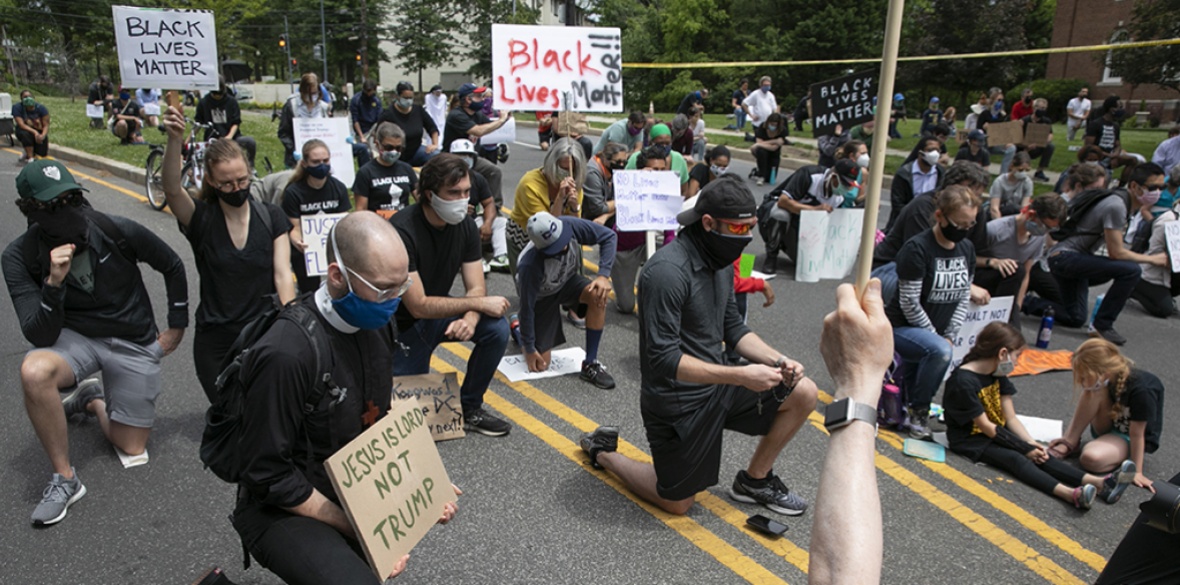THE greatest wave of protest to rock the United States since 1968 has prompted President Donald Trump to threaten his own people with the army.
Trump’s attitude from the start of marches demanding justice for George Floyd, murdered on camera by police, has been calculated to inflame anger.
He has revived a 1960s segregationist battle cry (“when the looting starts, the shooting starts”) and consciously used the word “war” to describe the confrontation between the rising anti-racist movement and the US state.
His determination to treat the crisis as a battle in the culture war is exemplified by using riot police to disperse crowds so he could pose with a bible outside a church — a stunt, it should be noted, that has been widely condemned by religious leaders.
Through all this the protests continue to swell. It is an uprising with deep roots.
George Floyd’s death was the spark, but like those of Ahmaud Arbery, Breonna Taylor, Eric Garner, Trayvon Martin and countless others — among the latest David McAtee, gunned down in Louisville during the current protests — it forms part of a pattern of racist killings of black people which go unpunished.
Not all the above were police victims but the number of civilians killed by the US’s heavily militarised police force is at epidemic levels and black people make up a far greater proportion of the dead than they do of the population.
Popular fury cannot be divorced either from the backdrop to the protests: a United States which has lost over 100,000 lives to coronavirus, the highest death toll on Earth, where the pandemic has seen joblessness soar to 50 million.
Race matters in these statistics. Black US citizens are twice as likely to die from Covid-19 as their white counterparts.
As 75 per cent of front-line workers — in shops, driving buses, making deliveries, working in healthcare and so on — in New York are from an ethnic minority, the intersection between racial oppression and class exploitation explains the catastrophic death rate among black Americans.
As in Britain, US residents in the lowest-income groups are most likely to have been laid off or have had their income reduced further since the pandemic struck, and women have been hit harder than men.
These facts point to deep, enduring structural injustices in US society which are becoming intolerable.
In the face of this upheaval, the suggestion of the Democrats’ chosen standard bearer of the anti-Trump cause, Joe Biden, that authorities could address police violence by training them to shoot at people’s legs is pathetic and tone deaf.
It comes nowhere near grasping the causes of police killings or the scale of social and economic change needed.
The defeat of Bernie Sanders for the Democrat nomination, like the shift from Jeremy Corbyn’s leadership of Labour to Keir Starmer’s in Britain, leaves the country with an “official” opposition that objects to some of the morbid symptoms of an unsustainable social order — Trump, Boris Johnson — but is too wedded to that order to lead the fight for a better one.
In the United States, the Black Lives Matter cause is now at the forefront of a movement of working-class people that is shaking cities from coast to coast.
Even as Trump rages against it, it has won important victories — the prosecution for murder of police killer Derek Chauvin, the dismissal of Louisville police chief Steve Conrad after McAtee’s killing.
Here, too, Parliament’s inability to reflect the interests of the working class means pressure for systemic change must be built up in communities and workplaces.
The fights against a chaotic, unprepared and barely monitored relaxation of lockdown and catastrophic job losses are already beginning.
The brave protesters taking to the streets in the US — whose very cause demonstrates the real danger they are placing themselves in — do not just deserve our solidarity, but have a great deal to teach us.











